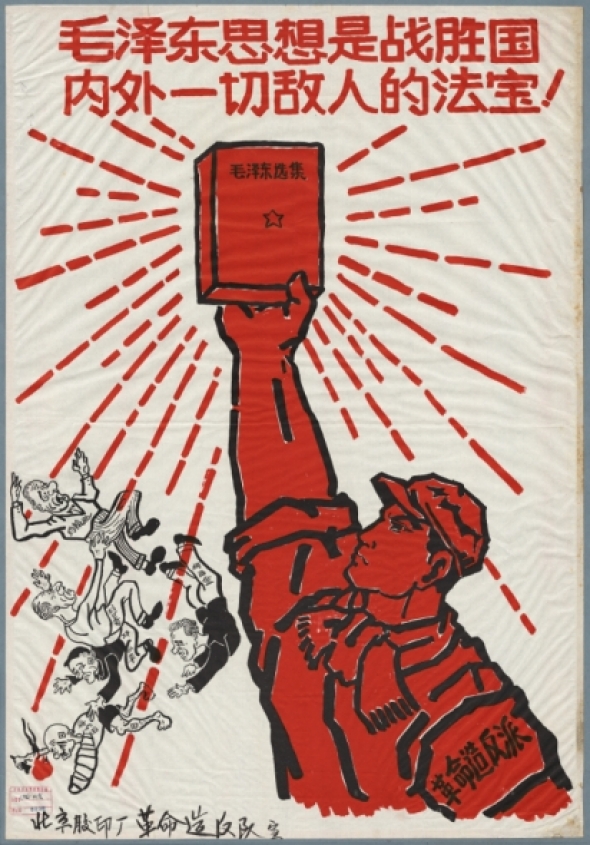Revolutionary Leaflets and Comrade Things
In his recent Anti-Book, Nicholas Thoburn finds the communist escape hatch leading out of the fortified gulag of commodity-book production. Review by Anthony Iles
Revolutionary leaflets and kindred things: they look as though they have been overtaken by catastrophes, even when they are no older than 1918. Looking at them, one can see that what they wanted did not come to pass. Hence their beauty.
– Theodor W. Adorno, ‘Bibliographical Musings’1
Anti-Book is giving me a lot of trouble, it's coming on like a communist headache, the aspirin for which I have been waiting too long. Aside from the superficial problem that it is indeed very much like a book and not an anti-book,2 my main problem is that every time I open it I make so many notes that were I to read it like this in its entirety I would end up in possession of a document longer than the book itself. This confounds any attempt on my part to provide a summary, though I find myself trying to write one nonetheless.
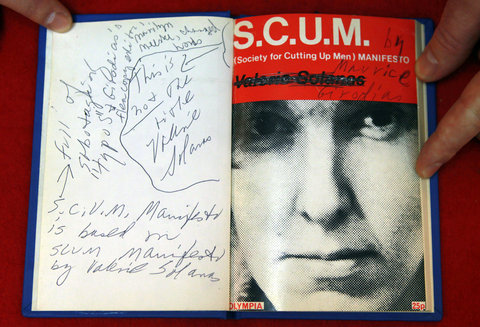 Image: New York City Public Library copy of the Olympia Press 1977 edition of SCUM Manifesto defaced by Valerie Solanas.
Image: New York City Public Library copy of the Olympia Press 1977 edition of SCUM Manifesto defaced by Valerie Solanas.
In his preface to Anti-Book, Thoburn outlines the project’s ‘communist intent’ to sketch an outline of a field of self-critical publishing. That is publishing which takes issue with the standardising form of publishing conventions and produces instead what he calls, after Rancière, ‘hieroglyphs of the anti-commodity’.3 This may raise the fear then that these printed objects, books, pamphlets and magazines will be framed within a logic of a bourgeois anti-capitalism, one which seeks to champion and amplify the exceptions to capitalism in order to undermine it and prefigure other social relations. However, Thoburn is anxious not to lead us down this rosy path paved with communes founded on private land and bourgeois commoners, instead, he argues that if his theoretical objects put communism at stake, ‘it is a communism that would draw attention to [...] contradictions and not make as though its intent can lift it from the world of capital’.4 Therefore, the projects Thoburn surveys tend to render from the determinations of print form barbed and spiky negations of readers’ expectations, popularity, even readability, print conventions, and the ‘transposable’ feigned universality of the book as a commodity. These attacks offer up the conventions they negate to critical examination, indicating not only the gaps between socially necessary labour and its potentially non-alienated counterpart but also non-alienated labour’s impossibility under capitalism and how a published product directed towards purportedly universal utility and accessibility must participate in a chain of deformations in order to become a bearer of exchange value. Thoburn argues that many small press projects, indeed many pamphlets, have a price but no exchange value, this does not necessarily make them exemplary of non-alienated labour. Rather, through a sequence of specific moves which denature wage labour and engender critical thought about their own manufacture, they unsettle ‘work and its identities’.5 The flight from labour is not a model, but an antagonistic standpoint from which issues the production of singular allegorical objects through which to think communism as a movement of negation and non-identity. This is, in Thoburn’s words, ‘a communism immanent to the social relations of capital’ and through it we travel through the concepts of ‘literary communism’6, ‘communist writing’ to an ‘expanded communism of printed matter’.7
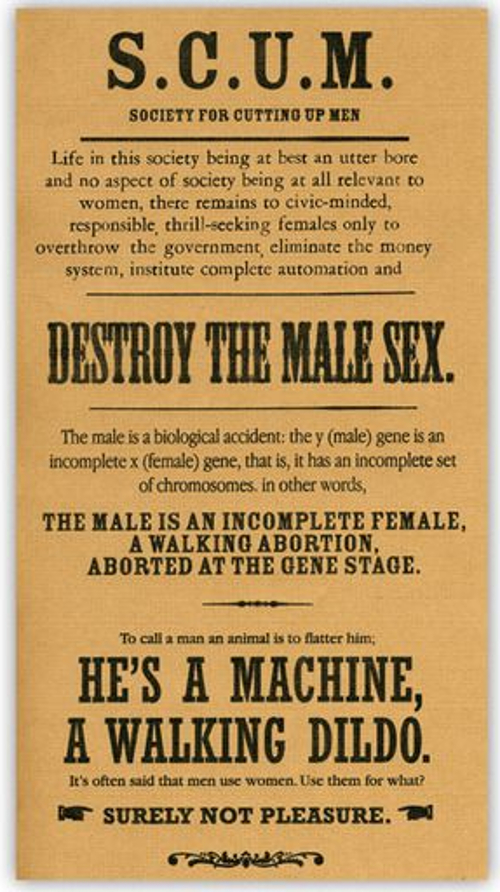
Image: Original (self-published) edition Valerie Solanas, SCUM Manifesto (Valerie Solanas, 1967)
The Anti-Book develops this ‘communism of printed matter’ primarily with reference to projects which mostly began their life in the world after the spectacle which was presented to us as the ‘fall of communism’ in 1989. As such, the book covers some of the more unusual left writing and publishing projects: Infopool, London Psychogeographical Association, Unpopular Books, Luther Blisset, Wu Ming, The Bernadette Corporation, the journals Tiqqun, Endnotes, Lies, Letters8 and not least Mute, which Thoburn describes as ‘a polymorphous and discontinuous aggregate, emerging over a 20 year time span.’9 At the latter end of that span the Anti-Book teases out the inventive assemblage and articulation of text-based media in recent movements such as Occupy, the Arab Spring and Black Lives Matter (Thoburn is currently working on a text which approaches a published collection of tweets from the 2015 Baltimore uprising). However, to establish his framework for a theory of materials which does not privilege the self-sufficiency of text, Thoburn draws upon a wide range of exemplars and counter-images.10 Chapter 1 discusses Lies, Letters, Strike, Chto Delat?, Tiempo Muerto, theories of the artists’ book, print media and theories of communisation. Chapter 2 discusses the relation of journals to artistic movements and political groups to journals and pamphlets, particularly focusing on the pamphlets of French communist theorist Jacques Camatte translated and republished by Unpopular Books, the wealth of political pamphlets housed at 56a Archive, and Infopool’s fragile and contested small press experiments. Chapter 3 discusses questions of form with reference to Deleuze and Guattari’s theories of the ‘root-book’ exploring the material antagonisms of Asger Jorn and Guy Debord’s Memoires, Russian Futurist books and the antinomies of the quasi-religious authority of Mao’s Little Red Book. Chapter 4 explores the politics of anonymity through Luther Blissett’s collectively authored novel Q, Bernadette Corporation’s pseudonymous novel Reena Spaulings and Michèle Bernstein’s All the King’s Horses, as well as the journal Tiqqun, the May 1968 journal Comité, the journal of communisation Endnotes and the theme of anonymity in Marx’s formulation of the ‘party’. Chapter 5 returns to themes of post-digital print to consider a particular publishing platform, Mute. Chapter 6 discusses Wu Ming’s ‘political mythopoesis’, the cult of the author and Wu Ming’s theory of the ‘unidentified narrative object’. Therefore, it is a tribute to Thoburn’s work, directly an obstacle to my own, that his book is a substantial and rich map and outline of a speculative object – experimental political publishing – which takes the form of fragments not contained by the book form.
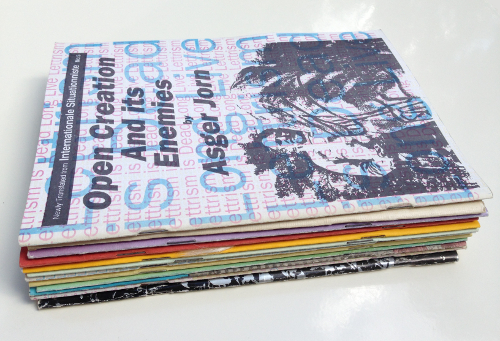
Image: Pamphlets published by Unpopular Books, including Asger Jorn, Open Creation and its Enemies, 1995
These fragments are ‘against the book’,11 resistant to the form of what Thoburn names the ‘root-book’, that is the book as image of, and separation from, the world of matter.12 The ‘root-book’ is presented as an initially religious paradigm that smooths the way for an inscrutable sum of standardising and market-compliant practices which established the book as a commodity.
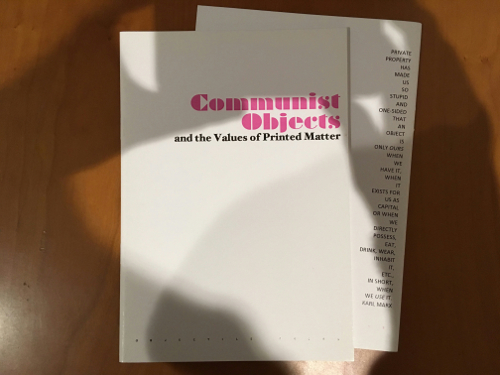
Image: Nicholas Thoburn, Communist Objects and the Values of Printed Matter, London: Objectile Press, 2010.
Appropriately, my first encounter with Thoburn’s project was at the 56A Infoshop archive while orbiting that magnet for heterogeneous commodity exchange and unorthodox writing: the Elephant & Castle shopping centre. In this pamphlet form, Communist Objects and the Values of Printed Matter (2010), Thoburn’s research remained faithful to the ‘fragility’ and contingency which such self-consciously small, self-critical and oppositional publishing experiments have sought to negotiate. Indeed those offended with the project’s eventual printed coherence and monumentality may gain succour from the fact that this is not the only published instantiation of Anti-Book. An earlier version, published in Serbian by Kuda.org, staged exactly the self-reflexively critical dialogue with the commodity book form that Thoburn’s project proscribes by fragmenting the book into a package comprised by three separate items: text (book), footnotes (pamphlet) and images (postcards).13 Indeed the University of Minnesota Press’s edition glues this all back together again to take the form of a standard academic book, but the projects Thoburn celebrates and critically surveys do not – they are paper assemblies where ‘content and form come into a generative and political relation of co-determination’,14 or they present a disjuncture between media form and signifying content which is politicising.
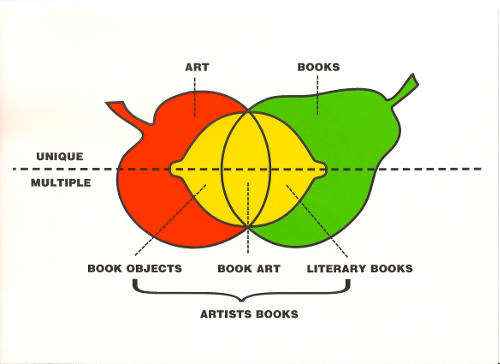 Image: Clive Phillpot, ‘Artist Books Diagram’, 1982
Image: Clive Phillpot, ‘Artist Books Diagram’, 1982
Anti-books articulate the encounter between communist thought and experimental practices of writing and publishing, where these encounters are not contained within social movements but emerge – albeit in a fragmentary and occasional fashion – across the terrain of textual media, a terrain where the commodity form plays a role no less commanding than it does for the audiovisual.15
Amongst a veritable wealth of arguments and specifications the Anti-Book develops what for me is its central and enduring argument that involves a thorough refutation of the traditionally Marxist ‘reach for “use value” as the reassuring ground for a politics of the object’.16 In Thoburn’s careful reconstruction from Walter Benjamin, Karl Marx and Boris Arvatov, he presents the argument that ‘our estranged relations to objects are a product and experience not only of “property” and “capital” but of “use” also.’17 Use is not exterior to exchange value but co-extensive with it. Therefore communist objects refuse capitalist use through an instinct for tactility and by opening up unforeseen mediations and critical dialogues with what is given, taken for granted or imposed as a formal determinations on their capacity to create. Anti-Book distils from this strong arguments about communist form. Anti-Book develops from Rosalind Krauss’ account of ‘the self-differing medium’18, through which works come to specify themselves, a quality Thoburn describes as an ‘open, recursive emergence through successive loops of self-interrogation’.19 Because ‘anti-book is not a distinct body of practices and works’ it takes cognisance of moves, established by artists’ books ‘with which it shares this boundary-breaking orientation’, but ultimately does not rest easily in this category, seeking out instead ‘the experimental condition of communist publishing’.20 Therefore we could say that communist publishing requires systematic elements, but these are structured in such a way as to undermine the boundaries presently set for it. It is in the modes of communist publishing that Thoburn surveys and constructs in his anti-book that the anti-systemic destruction of present meaning and given form is carried out more or less systematically.
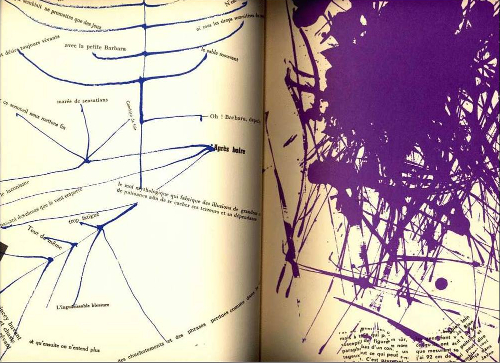
Image: Pages from Asger Jorn and Guy Debord, Memoires, Paris: L'Internationale situationniste; New York: Wittenborn and Company, 1959
By negotiating the pre-established rules and standards of publication, publishing projects detourn and estrange their supposed natural aspects. The estrangement of print conventions – think of Asger Jorn and Guy Debord’s Memoires (1959) bound in sandpaper, or an Infopool pamphlet (1999) bought, re-bound by an art institution, presented in a major exhibition without permission then recovered by its maker with bolt-cutters – exercises practical criticism of their commercial and arbitrary nature, but also constructs vehicles for political articulation which grasp at new insights, differentiations and conditions. In doing so, such projects solicit an active reader in touch with all their senses. This reader is to be bewildered, surprised and confused, but this is all the better for the object has not been fashioned in order to facilitate a relationship of instrumentality. A reader will need to read and engage actively to make their own minds up, to be critical, to pause and consider their own position. They will have to construct the contents from the difficult, potentially antagonistic field of its presentation, not swallow them whole without question. We should consider the opening of Walter Benjamin’s One Way Street:
The construction of life is at present in the power of facts far more than of convictions, and of such facts as have scarcely ever become the basis of convictions. Under these circumstances true literary activity cannot aspire to take place within a literary framework – this is, rather, the habitual expression of its sterility.
Were we to understand facts not to refer to the everyday ‘habitual’ ‘facts’ of journalistic construction, but instead to the material fact as faktura, a concept developed by Boris Arvatov, Sergei Tretiakov, Viktor Shklovsky, Alexander Rodchenko and others of the pre- and post-revolutionary Russian avant-garde, then Benjamin is suggesting a conjunction between writing (not literature) and the ways the printed object would bear the trace of its production on its surface. Faktura later developed into the concept of factography, which augmented this materialism of transparency with a special attention to the ‘processes of sign-production’ and composition in works.21Anti-Book picks up this conceptual pairing through Arvatov’s work and the discussion of Futurist books. Thoburn’s examination of early Russian Futurist books printed on wallpaper and burlap stages the suture of these two concepts by describing the way the polysensuality of the material support and the word as ‘polymorphus object’ meet in ‘wild tactility’.22
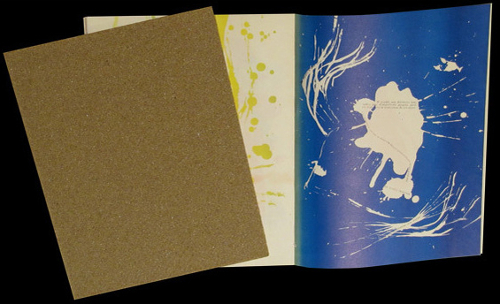
Image: Cover and pages from Asger Jorn and Guy Debord, Memoires, Paris: L'Internationale situationniste; New York: Wittenborn and Company, 1959
Significant literary work can only come into being in a strict alternation between action and writing; it must nurture the inconspicuous forms that better fit its influence in active communities than does the pretentious, universal gesture of the book – in leaflets, brochures, articles, and placards. Only this prompt language shows itself actively equal to the moment.23
While Benjamin’s statement and a fixed idea of ‘communist publishing’ could suggest a solely avant-garde pedigree, Thoburn’s achievement is not to develop an avant-garde tradition of the book/anti-book, but instead to hone in on and develop the ‘strict alternation between action and writing’ through attention to the materiality of printed objects and their circulation in the world. ‘Action’ is here not established as a guarantee of authentic political activity (how many riots, how many blockades, how many occupations, how many cadre members?) but instead it is movement produced through criticism of given forms of materiality, organisation, positionality, political orientation and authority. Action is theory, theory is class struggle, reflections on political organisation reflect on their written and published form. This is why the Anti-Book eschews the manifesto, a form which Thoburn argues amounts to a performative gesture which achieves authority through its conjuring of a subject. An approach that has been made redundant ‘by the historical loss of any referent that might plausibly serve as its subject.’24 This critique of a reified concept of the proletariat is at the centre of Thoburn’s concept of communism, a concept which is speculatively developed with reference to heterogeneous and singular configurations of printed matter that the book engages. Throughout, Anti-Book engages communist theoretical currents critical of the affirmation of labour as identity. These tendencies eschew the routine forms of falsification programmatic statements participate in and tear apart the stable identities of leader, party and worker. These are theoretically rich passages of Thoburn’s Anti-Book impossible to summarise further here. Their critical reconstruction of debates about organisation, identity, anonymity, party, internationalism, labour, gender and race are original in their own right and are all the richer for their threading through of acute attention to the specificities of their distributive delivery.
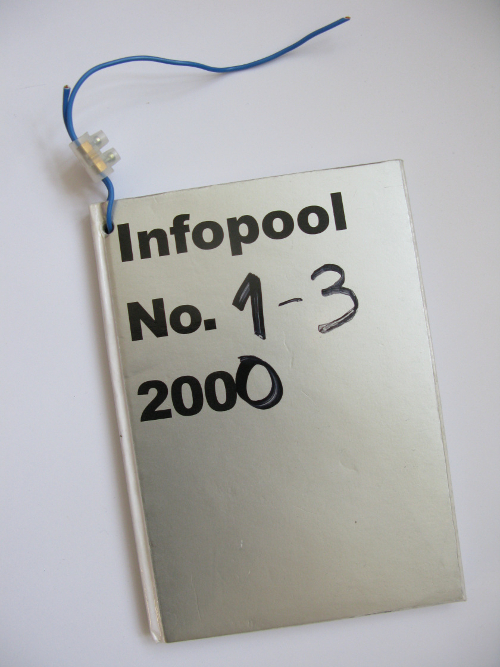
Image: ‘Operation Re-appropriation’. Three Infopool compiled and bound as a hardcover book bound and displayed at Tate Modern, recovered by the publisher 9 February 2001
As the field of book publishing has diversified (in terms of media, content, format, mixed media, manifold new online and offline independent publishers) its commercial centre increasingly confirms itself as a conservative ghetto whose shibboleth of ‘free speech’ is its greatest weapon in a fight to impose unfreedom everywhere.25 Thoburn’s insights on the cult of personality within authoritarian projections of the ‘leader as author’ are apposite here because they provide the index against which self-consciously minor and anti-identitarian forms of communist publishing have composed themselves against or satirised.26 Through the rich survey of forms of critical anonymity developed in Chapter 4 emerges a subterranean communism that is against ‘unity’ and instead seeks to ‘build complex assemblages’.27 These informal forms which we could best think of as disorganising rather than disorganised set themselves against the logic of enterprises which seek to reproduce themselves, against the false equivalence of the value form, against the false unities of patriotism and patriarchy which ‘found unity in the name of values that particularize’.28 Fleeting as they may be, such intensities draw together and mobilise strategic ephemeral forms of organisation (anonymity, self-organisation, informality) with the spontaneities of self-publishing (speed, small runs, DIY, anti-commercialism, independent distribution). Therefore, Thoburn is able to move back and forth from the generality of the commodity book to the specificities of radical articulations of communism in recent times.
![]()
Image: Viktor Ivanov, Great Stalin is Beacon of Communism!, 1949
In all these senses, Anti-Book isn’t an anti-book, but it does build the anti-book through the web of relations it develops. It does not pose as the book’s overcoming, but situates itself at a critical distance in order to foreground what would make that overcoming possible. Thoburn’s book is a feat of reading on his part rather than ours. In this best sense it is a gift in the spirit (but not quite the form) of the anti-productive, restless and difficult objects it assembles.
Anthony Iles <anthony AT metamute.org> is a Contributing Editor to Mute
Info
Nicholas Thoburn, Anti-Book: On the Art and Politics of Radical Publishing, Minneapolis: University of Minnesota Press, 2016.
1In Notes to Literature, Vol.II, ed. Rolf Tiedemann. (trans. Shierry Weber Nicholsen), New York; Chichester: Columbia University Press, 1992, p.29.
2As shall be clarified throughout this review Thoburn’s book is a discourse – an ‘abstraction’ and ‘conceptual map’ (p.2) – of the anti-book, not an anti-book itself. This is a ‘problem’ that the author himself acknowledges.
3Nicholas Thoburn, Anti-Book: On the Art and Politics of Radical Publishing, , Minneapolis: University of Minnesota Press, 2016, p.62.
4Ibid., p.ix.
5Ibid., p.107.
6This phrase is most commonly associated with the work of Jean-Luc Nancy, based on his engagement with the work of Maurice Blanchot and Georges Bataille. Anti-Book however, diverts from Nancy’s formulation presumably because of its emphasis on the self-sufficency of text and, directs us instead to the phrase’s origin in Gil Wolman & Guy Debord, ‘A User’s Guide to Détournement’, in Ken Knabb (ed.), Situationist International Anthology. Berkeley, Calif.: Bureau of Public Secrets, 2006. ‘Mode d’emploi du détournement’ originally appeared in the Belgian surrealist journal Les Lèvres Nues #8, May 1956. Available, http://www.bopsecrets.org/SI/detourn.htm
7Nicholas Thoburn, op. cit., pp.278-279.
8Cf. Mute’s review of Letters: Anti-political Communist Journal, John Cunningham, ‘Nihilists! One Less Effort if You Would be Nihilists’, 17 May 2011, http://www.metamute.org/editorial/articles/nihilis...
9Nicholas Thoburn, op. cit., p.233. In agreement with my fellow editors this review refrains from further comment on Chapter 5 of the Anti-Book which focuses primarily on Mute.
10 Ibid., p.110.
11 Ibid., p.1.
12 Ibid., pp.114-115.
14 Nicholas Thoburn, op. cit., p.xiii.
15 Ibid., p.2.
16 Ibid., p.71.
17 Ibid., p.72.
18A concept developed in Rosalind E. Krauss, ‘A Voyage on the North Sea’: Art in the Age of the Post-Medium Condition, London: Thames & Hudson, 2000.
19Nicholas Thoburn, op. cit., p.10.
20Ibid., p.13.
21Devin Fore, ‘The Operative Word in Soviet Factography’, October, No.118, Fall 2006, pp.95–131, p.100.
22Nicholas Thoburn, op. cit., pp.140-143.
23Walter Benjamin, ‘Filling Station’, in One-Way Street, and Other Writings, (Trans. Edmund Jephcott and Kingsley Shorter) London: New Left Books/Verso, 1979, p.45.
24Nicholas Thoburn, op. cit., p.27.
25Dennis Johnson, ‘Publishing in Wartime’, n.d., http://futureofthebook.org/blog/
26Ibid., p.276.
27A phrase gleaned from Frére Dupont, Species Being, and Other Stories. San Francisco: Ardent Press, 2007.
28Maurice Blanchot, ‘Communism Without Heirs’ (1968) in Political Writings, 1953-1993. (trans. Paul Zakir) Fordham University Press, 2010, p.92. The text is discussed in Thoburn, p.212.
Mute Books Orders
For Mute Books distribution contact Anagram Books
contact@anagrambooks.com
For online purchases visit anagrambooks.com

